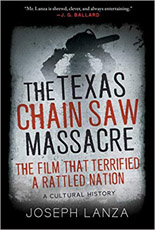
 Beginning with the oft-told anecdote of director Tobe Hooper fantasizing about crowd control via a certain gasoline-powered tool during a hectic holiday rush at Montgomery Ward (and thus planting the seeds that soon sprouted into an eventual horror classic), Joseph Lanza’s The Texas Chain Saw Massacre: The Film That Terrified a Rattled Nation is hardly the first nonfiction book about the 1974 movie. It is, however, a unique one. Lanza treads territory that prior TCM texts simply weren’t interested in exploring: the film as a result of American’s turbulent, troubled times. Those days were wrought with immense societal upheaval and disruption that arguably strengthened the movie’s effectiveness in striking chords and stirring up as much shit as it scared out of audience members.
Beginning with the oft-told anecdote of director Tobe Hooper fantasizing about crowd control via a certain gasoline-powered tool during a hectic holiday rush at Montgomery Ward (and thus planting the seeds that soon sprouted into an eventual horror classic), Joseph Lanza’s The Texas Chain Saw Massacre: The Film That Terrified a Rattled Nation is hardly the first nonfiction book about the 1974 movie. It is, however, a unique one. Lanza treads territory that prior TCM texts simply weren’t interested in exploring: the film as a result of American’s turbulent, troubled times. Those days were wrought with immense societal upheaval and disruption that arguably strengthened the movie’s effectiveness in striking chords and stirring up as much shit as it scared out of audience members.
In examining how the “post-’60s version of Hansel and Gretel” was shaped by the country’s mood at the time, the author does so more or less scene by scene, placing each chapter against a different aspect that was in the air: for example, the astrology craze, the dangers of hitchhiking, a nationwide beef shortage, the rise of porno chic, the birth of the serial killer. It’s a fascinating approach to considering a famous film, and an introductory page listing a “supporting cast” hints at the book’s depth and breadth: Johnny Carson, Richard M. Nixon, Alice Cooper, Linda Lovelace, the Zodiac Killer and the Ray Conniff Singers among them. But those just scratch the surface; among those unlisted but who come into play as the pages turn include Cormac McCarthy, Patty Hearst, Edmund Kemper, Charlie Chan, Barney Miller, Allen Ginsberg, Jim Jones, the NRA and the Loud family.
Lanza brings the same incisiveness he has to his previous subjects (from enfant terrible Ken Russell to ear-terrorizing elevator music), leaving us with a whip-smart whipcrack of a read: a mix of “making of,” film criticism, true crime, pop culture history, sociology and a historical zip through the zeitgeist during an era of pivotal uncertainty, when Americans went looking for the America they once knew … and found it dangling from a meathook. —Rod Lott
